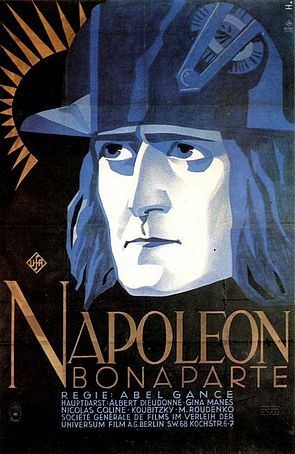To get to the first films on Napoleon you have to go back two centuries! Louis Lumière, the pioneering French cinematographer, made Entrevue de Napoléon et du Pape (Interview between Napoleon and the Pope) and Napoléon et la sentinelle (Napoleon and the sentry) in 1897. Since then, the Emperor’s been one of history’s most frequently filmed characters, whether as a central character or simply as a walk on. The famous grey greatcoat and hat have been donned by some of the greatest (French, but not only) actors. Some – and don’t forget that here I’m setting out my own personal list and de gustibus…-, including a few not necessarily endowed by nature for the part, make more than just a great stab at it, such as Albert Dieudonné, Raymond Pellegrin, Pierre Mondy, Rod Steiger and, more recently, Philippe Torreton. And all the genres are represented, from historical blockbusters, to private lives, police dramas, pochades and even a porn series. So much so, that it’s difficult to decide which one gets the Oscar (or should I say, since we’re in France, ‘César’), whether for ‘Best Film’ or ‘Best Napoleon’. As for the character, Dieudonné (in Abel Gance’s Napoléon) tries to be like him, Mondy (in the same director’s Austerlitz, 33 years later) attempts to look like him, Brando (in Désirée) goes for the dark side, and Torreton (in Monsieur N.) gives psychological depth. As for the films themselves, there something for everyone: battle scenes in Bondarchuk’s War and Peace and Waterloo (for which the Red Army provided divisions of soldiers as extras); the nicer side of the Napoleon saga in Guitry’s Napoléon; the galloping youngsters in Egyptian director Youssef Chahine’s Adieu Bonaparte; the suffocating atmosphere of St Helena in Polish director Kawalerowicz’s Otage de l’Europe, etc.
If I really had to choose, my two favourites would be Ridley Scott’s The Duellists (where the Napoleonic saga is simply the backdrop) and Antoine de Caune’s Monsieur N. (a playful manipulation of the pseudo enigmas of St Helena against a perfect recreation of the ambiance), the reason being that neither tries to recount the history or draw moral conclusions; they simply tell a part of the story freely and creatively. And happily, since I’m pretty sure that the film industry has not made its last Napoleonic film, this is very unlikely to be my final word on the subject.


